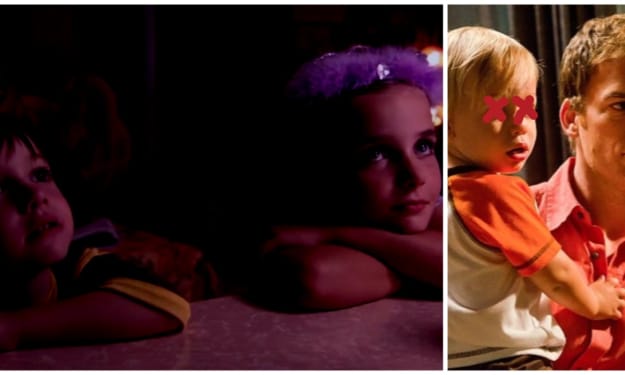Rian Johnson’s 'Looper' Creates the Most Problematic Time Travel Movie Ever
The 'Last Jedi' director’s time travel shoot-em-up from 2012 simplifies the concept’s complex science, but only succeeds in muddling it further. Could it have gone a different path?

Looper is my first experience watching a Rian Johnson film, so note that I haven’t seen The Last Jedi, so I don’t know what to expect. Now, I normally take it easy on the criticism when evaluating a time travel movie—mostly because time travel doesn’t even exist in real life, hence almost anything CAN make sense, in that weird, sorta bizarre way—but Looper by far has the most problematic time travel setup (and resolution) I’ve seen in any temporally-involved film since Back to the Future. It’s a little weird seeing two opposing time travel theories bunched together as if they were ever compatible—the parallel worlds theory, and the butterfly effect/one timeline theory—but that’s exactly where the problem lies.
SPOILERS AHEAD FOR THOSE WHO HAVEN’T SEEN THE FILM.
The Old Joe that initially survives ending his loop, and tries to change the past to save his wife, came from a timeline where the Rainmaker existed, yet he couldn’t possibly have been the one who killed Cid’s mother Sara, because the Old Joe from THAT timeline died. And his Young Joe lived out his years traveling and living in China immediately after killing the original Old Joe. So it’s either someone else that’s a looper killed Sara in that original timeline—leading to a future where Cid closes all the loops and becomes a crime boss—or Sara lived (like the ending for Looper seems to suggest) yet Cid became the Rainmaker anyway.
In Old Joe’s timeline, there were already rumors circulating about the Rainmaker: one, that he saw his mom get shot as a child, and two, that his jaw was broken at an early age, so he ended up getting a prosthetic installed. This all happened in the original timeline way before our Old Joe decided to change the past, so it implies Sara never actually survived, or was meant to survive. She simply endured to live another day (in this case, probably an actual single day).
Think about it. Sara was still shot during the Rainmaker’s childhood, by someone we don’t know who is definitely not Joe, and Cid was still injured in the jaw that led to his prosthetic later in life. So in Old Joe’s timeline, the future still occurred as predicted, entirely without his temporal intervention. This further implies that even with “new” Young Joe’s sacrifice, Sara still died at some point after Joe saved them both, eerily in the exact same way she was meant to die in either timeline. In conclusion—Cid still becomes the Rainmaker, even though the film wants us to believe the future changed, when in all actuality, Sara’s death might have simply been “delayed.”
I don’t know where I learned this, I forget, but this definitely came up in Terminator, the Flash, and X-Men: Days of Future Past, but there’s another time travel theory that posits, it doesn’t matter if you try to change history; the timeline will still find a way to set events down its original, previously intended path. “Correct” itself, basically. Events are simply delayed rather than prevented, hence the future remains unchanged. That said, I think it would have lent Looper more credibility (weird saying that since this is still theoretical science) if they showed an ending where Cid still becomes the Rainmaker, only in a slightly different way, so the story would at least make a little more sense.
Another issue I have with the film’s time travel rules is it literally created a grandfather paradox, which connects to the above problems. If Young Joe was killed, then Old Joe never existed, which means nobody ever traveled to the past to change history and kill the Rainmaker. This connects to my previous point, which is that no matter what happens, a looper kills Sara anyway, and Cid still becomes a crime boss to rain vengeance (get it? “rain” vengeance? ok, I’ll stop) on every looper in history. Again, this would have been okay if they showed Cid still becoming a mobster by the end of the movie.
The Flash did this in season one when Eobard Thawne’s ancestor killed himself so Thawne wouldn’t be born—and yet Thawne still exists to do all the things he did, because the timeline simply created a time remnant in his place, in the universe’s efforts to safeguard the past, and keep the original history intact.
Another way Rian Johnson’s time travel Western could have worked, is by multiverse theory. No one-timeline shenanigans; just parallel worlds. Say, Looper follows the rules of Avengers: Endgame. When you change even the smallest thing in the past, it creates a branch timeline. A new, alternate timeline with entirely different events. The butterfly effect would still apply in this scenario. This way, a future without the Rainmaker’s “rain of terror” CAN exist. Sara can live out her days raising Cid to become a good, upright, and law-abiding TK, and the future is changed. Why? Because multiverse, that’s why. Any possible series of coincidences can exist, and the writer doesn’t have to live in a world where everything is inevitable, and annoying paradoxes are the preexisting laws of the land.
I like the concept and the ambience of Looper—it’s like 50s mafia films, but set in the far future—and that’s really cool. But the execution feels incomplete. Rian Johnson, who also wrote the screenplay, pointedly refused to explain the rules of HIS time travel story to keep the narrative simple, but this decision just resulted in an even bigger, discombobulating mess. Instead of managing to simplify something as complicated as time travel, he made it feel several cycles more confusing. I’ve seen other storytellers make this same mistake: in their efforts to simplify something difficult and convoluted, they end up tangling the narrative worse than if they had at least bothered to flesh out the plot, and in this case, explain the rules.
If Johnson had simply mentioned the multiverse theory—and ONLY that—as Looper’s preexisting law of time travel, then all the paradoxes stated would never have happened. Young Joe kills himself to erase Old Joe from this timeline, thereby creating an entirely new branch timeline where Sara survives and Cid probably becomes a superhero. Who knows?
I know from experience (especially now that I’m working on my own screenplays) how insanely maddening it is to fit a lengthy story into 120 minutes, but couldn’t Rian Johnson have cut out another set of lines and scenes OTHER THAN the ones that could have explained the story better, and provided a more airtight ending?
Good lesson to learn. If you’re going to tackle something as confounding as time travel, make sure not to half-ass it. Still, I don’t entirely blame Rian Johnson. My first pitch last year was a time travel movie, and it blew my mind so much I ended up casting it aside. “Fried my brain like an egg,” like Abe said. But if other screenwriters could tell good time travel stories, and live to tell the tale, and not be heavily criticized, then we all have the capacity to write and direct something better than what Johnson attempted to produce.
Watch every other time travel movie that managed NOT to fall into the trap Johnson accidentally set on himself. A good writer can make any convoluting plot point feel plausible, as long as they’re willing to go all the way.
About the Creator
Dylan Balde
Secretly Dead and Strange, writes for a living. Moonlights as a cat-obsessed dork and innocuously wrapped human nitroglycerin. My life is an everyday Westchester incident. 💀 @dylanbalde
Enjoyed the story? Support the Creator.
Subscribe for free to receive all their stories in your feed. You could also pledge your support or give them a one-off tip, letting them know you appreciate their work.






Comments
There are no comments for this story
Be the first to respond and start the conversation.